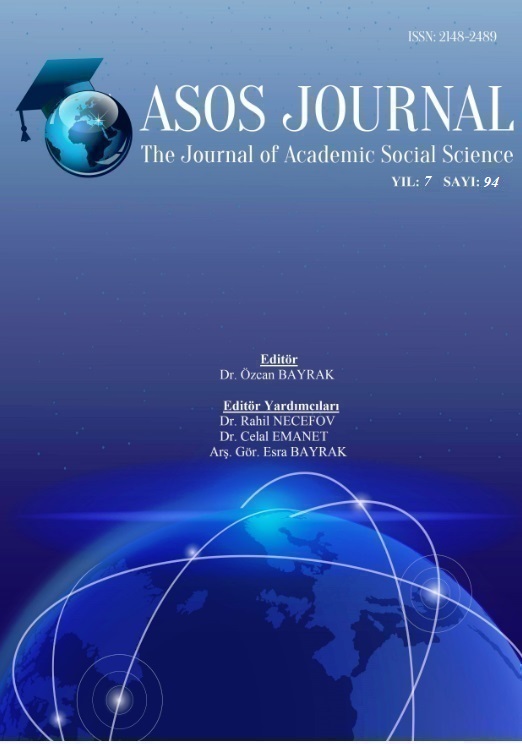Author :
Abstract
Bu araştırma ile aktif olarak spor yapan kadın sporcuların kişisel etik duruşlarının incelenmesi amaçlanmıştır. Araştırma ilişkisel tarama modeli olup, veriler anket yöntemiyle elde edilmiştir. Sporcuların etik eğilimlerinin incelendiği çalışmanın örneklem grubu 2017/2018 sezonu Futbol, Voleybol, Basketbol, Hentbol branşlarında kadın Sporcular oluşturmuştur. Veri toplama aracı olarak birinci bölümde kişisel bilgileri sorgulayan ifadelere verilirken ikinci bölümde “Etik Duruş Ölçeği” kullanılmıştır. Etik Duruş Ölçeği’nin idealizim ve görecelilik alt boyutları incelenmiştir. Anket formundan elde edilen verilerin analizleri, SPSS 22.0 paket programı kullanılarak yapılmıştır. Demografik bilgilerin belirlenmesinde frekans ve yüzdelik hesaplamalar yapılmıştır. Verilerin analizine geçilmeden önce uygulanacak testi belirlemek için Kolmogorov-Simirnov testi ile verilerin normal bir dağılım gösterip göstermediğine bakılmış ve bu dağılımların normal bir dağılım göstermediği belirlenmiştir. Bu yüzden ikili grup karşılaştırmalar için Non-parametrik test grubunda yer alan Mann-Whitney U testi, çoklu karşılaştırmalar için Kruskal Wallis testi ile verilerin analizi yapılmıştır. İstatistiksel anlamlılık düzeyi p<0.05 olarak kabul edilmiştir. Araştırmamız sonucunda elde ettiğimiz verilere göre; Kadın sporcuların branş değişkeni için yapılan ikili ve üçlü grup karşılaştırmalarında EDÖ’nin alt boyutlarında anlamlı düzeyde bir fark bulunmuştur. Anlamlı farklılığın; görecelik alt boyutunun, idealizim alt boyutuna göre yüksek olduğu gözlenmiştir. Görecelik alt boyutunda ise voleybol branşındaki sporcularaın, futbol branşındaki sporculara göre etik duruşlarının daha yüksek olduğu gözlenmiştir (p<0,05). Kadın sporcuların öğrenim durumu değişkeni, Spor yılı değişkeni ve Yaş değişkeni açısından EDÖ envanterinde anlamlı bir farklılık gözlenmemiştir.
Keywords
Abstract
In this study, it was aimed to investigate the personal ethical position of female athletes, who actively do sports. The study was conducted by adopting the relational scanning model, and the data were collected using the survey method. The sample group of the study, which investigated ethical positions of athletes, consisted of female athletes from Football, Volleyball, Basketball and Handball in the 2017/2018 season. As the data collection tool, the first section included matters aimed at personal information while the second section covered the “Ethics Position Questionnaire (EPQ)”. The Ethics Position questionnaire was evaluated in terms of the subscales of idealism and relativism. The analyses of the data obtained from the survey form were conducted by using SPSS 22.0 package software. Frequency and percentage analyses were conducted in the determination of demographic information. Prior to the data analyses, the data were tested for normality distribution by using the Kolmogorov-Smirnov test in order to determine the tests to be used, and it was determined that the data did not provide normality distribution. Thus, the Mann-Whitney test, which is one of the non-parametric tests, was used for two-sample group comparisons while the Kruskal Wallis test was used for multiple sample comparisons in the data analyses. The statistical significance level was determined as p<0.05. According to the data obtained as a result of the study, it was determined that statistically significant differences existed between the subscales of EPQ in the two and three-sample comparisons. It was observed in the significant difference that the relativity subscale was higher compared to the idealism subscale. In the relativity subscale, it was observed that the ethics position of the athletes in the volleyball branch was higher compared to those in the football branch (p<0.05). In terms of the education level, sports years and age variables of the female athletes, no significant difference was observed in the EPQ inventory.





